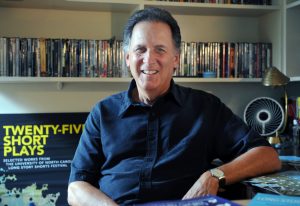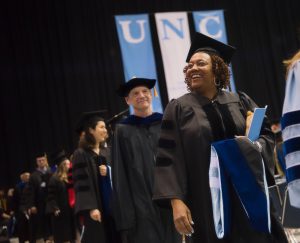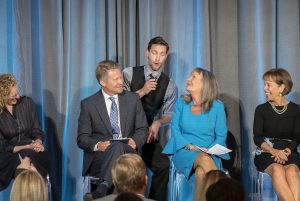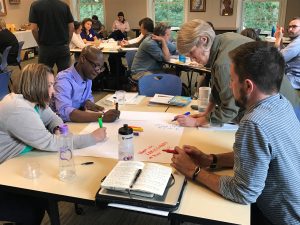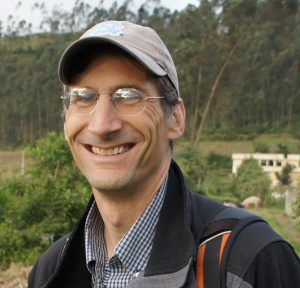 Once and For All (Viking Books for Young Readers, June 2017) by Sarah Dessen (English ’93). The latest from young adult fiction writer Dessen focuses on wedding planner Louna, whose summer job is to help brides plan their perfect day, even though she stopped believing in happily-ever-after when her first love ended tragically. But charming girl-magnet Ambrose isn’t about to be discouraged now that he’s met the one he really wants, and maybe Louna’s second chance is standing right in front of her.
Once and For All (Viking Books for Young Readers, June 2017) by Sarah Dessen (English ’93). The latest from young adult fiction writer Dessen focuses on wedding planner Louna, whose summer job is to help brides plan their perfect day, even though she stopped believing in happily-ever-after when her first love ended tragically. But charming girl-magnet Ambrose isn’t about to be discouraged now that he’s met the one he really wants, and maybe Louna’s second chance is standing right in front of her.
Best Creative Nonfiction of the South, Volume II: North Carolina (Texas Review Press, October 2017), co-edited by Michael Chitwood, faculty member in creative writing, and Casey Clabough. This North Carolina volume contains essays that celebrate and document the Tar Heel state’s diverse cultures and geography, from the mountains to the sea. It features works by five UNC creative writing faculty members: Bland Simpson, Michael McFee, Stephanie Griest, Randall Kenan and Marianne Gingher. All of the writers included in the book come from diverse backgrounds, generations and artistic traditions.
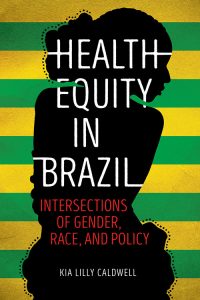 Health Equity in Brazil: Intersections of Gender, Race and Policy (University of Illinois Press, July 2017) by Kia Caldwell, associate professor of African, African American and diaspora studies. Brazil’s leadership role in the fight against HIV has brought its public health system widespread praise. But the nation still faces serious health challenges and inequities. Though home to the world’s second largest African-descendant population, Brazil failed to address many of its public health issues that disproportionately impact Afro-Brazilian women and men. Caldwell draws on 20 years of engagement with activists, issues and policy initiatives to document how the country’s feminist health movement and black women’s movement have fought for much-needed changes in women’s health.
Health Equity in Brazil: Intersections of Gender, Race and Policy (University of Illinois Press, July 2017) by Kia Caldwell, associate professor of African, African American and diaspora studies. Brazil’s leadership role in the fight against HIV has brought its public health system widespread praise. But the nation still faces serious health challenges and inequities. Though home to the world’s second largest African-descendant population, Brazil failed to address many of its public health issues that disproportionately impact Afro-Brazilian women and men. Caldwell draws on 20 years of engagement with activists, issues and policy initiatives to document how the country’s feminist health movement and black women’s movement have fought for much-needed changes in women’s health.
The Land of Enterprise: A Business History of the United States (Simon & Schuster, April 2017) by Benjamin Waterhouse, associate professor of history. A new, gripping history of America —told through the executives, bankers, farmers and politicians who paved the way from colonial times to the present — reveals that this country was founded as much on the search for wealth and prosperity as the desire for freedom. The Land of Enterprise is not only a comprehensive look into 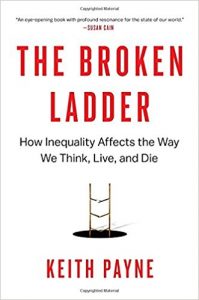 our past achievements, but offers clues as to how to confront the challenges of today’s world: globalization, income inequality and technological change.
our past achievements, but offers clues as to how to confront the challenges of today’s world: globalization, income inequality and technological change.
The Broken Ladder: How Inequality Affects the Way We Think, Live and Die (Penguin Random House, May 2017) by Keith Payne, professor of psychology. The levels of inequality in the world today are on a scale that have not been seen in our lifetime, yet the disparity between rich and poor has ramifications that extend far beyond mere financial means. In The Broken Ladder, Payne examines how inequality divides us not just economically; it also has profound consequences for how we think, how we respond to stress, how our immune systems function, and even how we view moral concepts such as justice and fairness. Read more in The New York Times.
The Idea of the Muslim World: A Global Intellectual History (Harvard University Press, April 2017) by Cemil Aydin, professor of history. When President Barack Obama visited Cairo in 2009 to deliver an address to Muslims worldwide, he followed in the footsteps of countless politicians who have taken the existence of a unified global Muslim community for granted. But as Aydin explains in this provocative history, it is a misconception to think that the world’s 1.5 billion Muslims constitute a single religio-political entity. The Idea of the Muslim World searches for the intellectual origins of a mistaken notion and explains its enduring allure for non-Muslims and Muslims alike.
The Gauntlet (Balzer + Bray, May 2017) by Megan Shepherd (international studies ’04), New York Times bestselling author of the Madman’s Daughter Series. In this thrilling finale to the Cage series, Cora and her friends have escaped the Kindred station and landed at Armstrong — a supposed safe haven on a small moon — where they plan to regroup and figure out how to win the Gauntlet, the challenging competition to prove humanity’s intelligence and set them free. With the whole universe at stake, Cora will do whatever it takes, including pushing her body and mind to the breaking point, to escape Armstrong and run the Gauntlet — though it might destroy her in the process.
QL 4 (TouchPoint Press, May 2017) by James Garrison (English and history ’68). Private First Class Bell, a newly-minted U.S. Army MP, quickly discovers that there’s more than a war going on along QL 4, the main road from Saigon into the Mekong Delta. It is old-fashioned crime and corruption. He doesn’t want to get involved, just serve out his time and go home, but life for an American MP in Vietnam in 1970 doesn’t work that way. QL 4 is a story of intrigue, betrayal and crime among soldiers on the same side in an unpopular war.
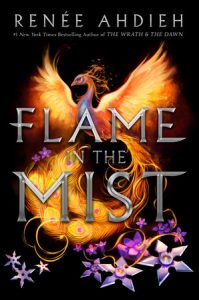 Flame in the Mist (G.P. Putnam’s Sons Books for Young Readers, May 2017) by Renee Ahdieh (English and political science ’05). The daughter of a prominent samurai, Mariko has long known her place — because she is not a boy, her future has always been out of her hands. At just 17, Mariko is promised to Minamoto Raiden, the son of the emperor’s favorite consort — but en route to the imperial city of Inako, Mariko narrowly escapes a bloody ambush by a dangerous gang of bandits known as the Black Clan who have been hired to kill her. Dressed as a peasant boy, Mariko sets out to infiltrate the Black Clan and track down those responsible for the target on her back. However, once within their ranks, she finds herself falling in love — a love that will force her to question everything she’s ever known.
Flame in the Mist (G.P. Putnam’s Sons Books for Young Readers, May 2017) by Renee Ahdieh (English and political science ’05). The daughter of a prominent samurai, Mariko has long known her place — because she is not a boy, her future has always been out of her hands. At just 17, Mariko is promised to Minamoto Raiden, the son of the emperor’s favorite consort — but en route to the imperial city of Inako, Mariko narrowly escapes a bloody ambush by a dangerous gang of bandits known as the Black Clan who have been hired to kill her. Dressed as a peasant boy, Mariko sets out to infiltrate the Black Clan and track down those responsible for the target on her back. However, once within their ranks, she finds herself falling in love — a love that will force her to question everything she’s ever known.
On Tokyo’s Edge: Gaijin Tales from Postwar Japan (Red Mountain Press, May 2017) by Gordon Ball (M.A. English ’76, Ph.D. English ’81). These 23 short stories reaffirm author Ball’s absorption with, and illumination of, “vanished” people, places and times. The book re-creates the texture of life among a rarefied group of relatively isolated foreigners in American–Occupied Japan and in the decade following Occupation. Peopling these interrelated short fictions are a great range of vivid characters, including schoolmates, lovers, military men, chemistry teachers, maids, a lustful preacher and a missionary of exemplary character.
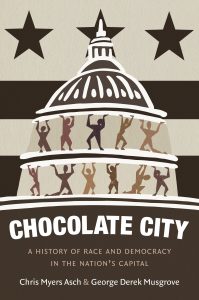 Chocolate City: A History of Race and Democracy in the Nation’s Capital (UNC Press, November 2017) by Chris Myers Asch (M.A. history ’00, Ph.D. American history ‘05) and George Derek Musgrove. Monumental in scope and vividly detailed, Chocolate City tells the tumultuous, four-century story of race and democracy in our nation’s capital. Emblematic of the ongoing tensions between America’s expansive democratic promises and its enduring racial realities, Washington often has served as a national battleground for contentious issues, including slavery, segregation, civil rights, the drug war and gentrification. But D.C. is more than just a seat of government, and authors Asch and Musgrove also highlight the city’s rich history of local activism.
Chocolate City: A History of Race and Democracy in the Nation’s Capital (UNC Press, November 2017) by Chris Myers Asch (M.A. history ’00, Ph.D. American history ‘05) and George Derek Musgrove. Monumental in scope and vividly detailed, Chocolate City tells the tumultuous, four-century story of race and democracy in our nation’s capital. Emblematic of the ongoing tensions between America’s expansive democratic promises and its enduring racial realities, Washington often has served as a national battleground for contentious issues, including slavery, segregation, civil rights, the drug war and gentrification. But D.C. is more than just a seat of government, and authors Asch and Musgrove also highlight the city’s rich history of local activism.
New Voyages to Carolina: Reinterpreting North Carolina History (UNC Press, October 2017) by Larry E. Tise (Ph.D. American history ‘74) and Jeffrey J. Crow. New Voyages to Carolina offers a bold new approach for understanding and telling North Carolina’s history. Recognizing the need for such a fresh approach and reflecting a generation of recent scholarship, 18 distinguished authors have sculpted a broad, inclusive narrative of the state’s evolution over more than four centuries. The volume provides new lenses for reimagining the state’s past. Transcending traditional markers of wars and elections, the contributors map out a new chronology encompassing geological realities; the unappreciated presence of Indians, blacks and women; religious and cultural influences; and abiding preferences for industrial development within the limits of “progressive” politics.
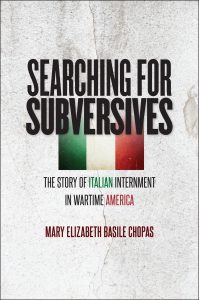 Searching for Subversives: The Story of Italian Internment in Wartime America (UNC Press, November 2017) by Mary Elizabeth Basile Chopas (Ph.D. history ‘13). When the United States entered World War II, Italian nationals living in this country were declared enemy aliens and faced with legal restrictions. Several thousand aliens and a few U.S. citizens were arrested and underwent flawed hearings, and hundreds were interned. Shedding new light on an injustice often overshadowed by the mass confinement of Japanese Americans, Chopas traces how government and military leaders constructed wartime policies affecting Italian residents and demonstrates the lasting social and cultural effects of government policies on the Italian American community.
Searching for Subversives: The Story of Italian Internment in Wartime America (UNC Press, November 2017) by Mary Elizabeth Basile Chopas (Ph.D. history ‘13). When the United States entered World War II, Italian nationals living in this country were declared enemy aliens and faced with legal restrictions. Several thousand aliens and a few U.S. citizens were arrested and underwent flawed hearings, and hundreds were interned. Shedding new light on an injustice often overshadowed by the mass confinement of Japanese Americans, Chopas traces how government and military leaders constructed wartime policies affecting Italian residents and demonstrates the lasting social and cultural effects of government policies on the Italian American community.
Claiming Turtle Mountain’s Constitution: The History, Legacy, and Future of a Tribal Nation’s Founding Documents (UNC Press, September 2017) by Keith Richotte Jr, an assistant professor of American studies. In this book, Richotte offers a critical examination of one tribal nation’s decision to adopt a constitution. By asking why the citizens of Turtle Mountain 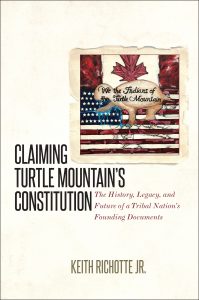 voted to adopt the document despite perceived flaws, he confronts assumptions about how tribal constitutions came to be, reexamines the status of tribal governments in the present and offers a fresh set of questions as we look to the future of governance in Native America and beyond.
voted to adopt the document despite perceived flaws, he confronts assumptions about how tribal constitutions came to be, reexamines the status of tribal governments in the present and offers a fresh set of questions as we look to the future of governance in Native America and beyond.
Color and Character: West Charlotte High and the American Struggle over Educational Equality (UNC Press, September 2017) by Pamela Grundy (M.A. history ’91, Ph.D. history ’97). At a time when race and inequality dominate national debates, the story of West Charlotte High School illuminates the possibilities and challenges of using racial and economic desegregation to foster educational equality. Drawing on nearly two decades of interviews with students, educators and alumni, Grundy uses the history of a community’s beloved school to tell a broader American story of education, community, democracy and race — all while raising questions about present-day strategies for school reform.
 The Farmhouse Chef: Recipes and Stories from My Carolina Farm (UNC Press, September 2017) by Jamie DeMent (B.A. history ’01). From fall’s “Sage- and Sausage-Stuffed Acorn Squash” to “Pear and Bacon Salad,” to summer’s “Sugarcane Barbecue Chicken” and “Watermelon Mojitos,” DeMent’s cooking style highlights no-nonsense approaches using great ingredients combined with easy preparations for supercharged flavor. Accompanying the recipes are DeMent’s deliciously observant stories illuminating what life is really like on a working farm.
The Farmhouse Chef: Recipes and Stories from My Carolina Farm (UNC Press, September 2017) by Jamie DeMent (B.A. history ’01). From fall’s “Sage- and Sausage-Stuffed Acorn Squash” to “Pear and Bacon Salad,” to summer’s “Sugarcane Barbecue Chicken” and “Watermelon Mojitos,” DeMent’s cooking style highlights no-nonsense approaches using great ingredients combined with easy preparations for supercharged flavor. Accompanying the recipes are DeMent’s deliciously observant stories illuminating what life is really like on a working farm.
Lost Luggage (Poisoned Pen Press, October 2017) by Wendall Thomas (B.A. English ’81, M.A. English ’85). Cyd Redondo, a young, third-generation Brooklyn travel agent who specializes in senior citizens, has never ventured farther than New Jersey. Yet even Jersey proves risky when her Travel Agents’ Convention fling, Roger Claymore sneaks out of her Atlantic City hotel room at 3 a.m. Back in Brooklyn, when she reads about smugglers stopped at JFK with skinks in their socks or monkeys down their pants, she never imagines she will join their ranks. But days after the pet store owner next door to Redondo Travel is poisoned, she finds herself thrown heels-first into the bizarre and sinister world of international animal smuggling.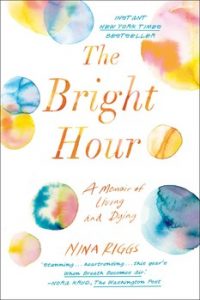
The Bright Hour (Simon & Schuster, June 2017) by the late Nina Riggs, former UNC creative writing instructor. Nina Riggs was just 37 years old when initially diagnosed with breast cancer. Within a year Riggs, the mother of two sons ages 7 and 9, and married 16 years to her best friend, received the devastating news that her cancer was terminal. How does one approach the moments, big and small, with both love and honesty? Exploring motherhood, marriage, friendship and memory, even as she wrestles with the legacy of her great-great-great grandfather, Ralph Waldo Emerson, Riggs’s breathtaking memoir continues the urgent conversation that Paul Kalanithi began in When Breath Becomes Air. She asks, what makes a meaningful life when one has limited time?
Listening for Africa: Freedom, Modernity and the Logic of Black Music’s African Origins (Duke University Press, August 2017) by David Garcia, associate professor of music. In Listening for Africa, Garcia explores how a diverse group of musicians, dancers, academics and activists engaged with the idea of black music and dance’s African origins between the 1930s and 1950s. Garcia examines the work of figures ranging from Melville J.  Herskovits to Dámaso Pérez Prado, and others who believed that linking black music and dance with Africa and nature would help realize modernity’s promises of freedom in the face of fascism and racism in Europe and the Americas, colonialism in Africa, and the nuclear threat at the start of the Cold War.
Herskovits to Dámaso Pérez Prado, and others who believed that linking black music and dance with Africa and nature would help realize modernity’s promises of freedom in the face of fascism and racism in Europe and the Americas, colonialism in Africa, and the nuclear threat at the start of the Cold War.
Reenu-You (Book Smugglers Publishing, March 2017) by Michele Tracy Berger, associate professor of women’s studies. New York City, August 1998. On a muggy summer day, five women wake up to discover purple scab-like lesions on their faces — a rash that pulses, oozes and spreads in spiral patterns. As more women show up with the symptoms, one clear correlation emerges: an all-natural, first-of-its-kind hair relaxer called Reenu-You. At the heart of the epidemic are these five original women; each from different walks of life. As the world crumbles around them, they will discover more about each other, about themselves, and draw strength to face the future together.
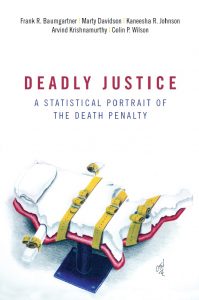 Deadly Justice: A Statistical Portrait of the Death Penalty (Oxford University Press, October 2017) by Frank Baumgartner, Richard J. Richardson Distinguished Professor of Political Science, Marty Davidson, Kaneesha R. Johnson, Arvind Krishnamurthy and Colin P. Wilson. Deadly Justice, which Baumgartner wrote with four former UNC undergraduate students, is a comprehensive examination of the record established through 40 years of experience with the “new and improved” death penalty. The book’s empirical focus provides hard statistical evidence that not only has the modern system retained the vast majority of the issues that concerned the justices in Furman v. Georgia, but several new problems have arisen as well.
Deadly Justice: A Statistical Portrait of the Death Penalty (Oxford University Press, October 2017) by Frank Baumgartner, Richard J. Richardson Distinguished Professor of Political Science, Marty Davidson, Kaneesha R. Johnson, Arvind Krishnamurthy and Colin P. Wilson. Deadly Justice, which Baumgartner wrote with four former UNC undergraduate students, is a comprehensive examination of the record established through 40 years of experience with the “new and improved” death penalty. The book’s empirical focus provides hard statistical evidence that not only has the modern system retained the vast majority of the issues that concerned the justices in Furman v. Georgia, but several new problems have arisen as well.
Brooklyn’s Renaissance: Commerce, Culture and Community in the Nineteenth-Century Atlantic World (Palgrave Macmillan, June 2017) by Melissa Meriam Bullard, a UNC professor of Renaissance and Early Modern European history. The book shows how modern Brooklyn’s proud urban identity as an arts-friendly community originated in the mid-19th century. Before and after the Civil War, Brooklyn’s elite, many engaged in Atlantic trade, established more than a dozen cultural societies, including the Philharmonic Society, Academy of Music, and Art Association. Bullard provides a cultural analysis of Brooklyn’s development in the context of the Renaissance in Europe.
The Hamlet Fire: A Tragic Story of Cheap Food, Cheap Government and Cheap Lives (The New Press, September 2017) by Bryant Simon (B.A. history ’83, Ph.D. history ’92), professor of history at Temple University. On the morning of Sept. 3, 1991, the day after Labor Day, the Imperial Food Products chicken plant factory that had never been inspected burst into flame. Twenty-five people — many of whom were black women with children, living on their own — perished that day behind the plant’s locked and bolted doors. After spending several years talking to local residents, state officials and survivors of the fire, award-winning historian Bryant Simon has written a vivid, potent, and disturbing social autopsy of the town of Hamlet, the chicken factory, and this time that shows how cheap labor, cheap government and cheap food came together in a way that was bound for tragedy. Read a Washington Post review.
Rocket Fantastic: Poems (Persea, September 2017) by Gabrielle Calvocoressi, assistant professor of creative writing and Walker Percy Fellow in Poetry. Rocket Fantastic reinvents the landscape and language of the body in interconnected poems that entwine a fabular past with an iridescent future by blurring, with disarming vulnerability, the real and the imaginary. Publishers Weekly writes: “These poems balance wildness and control in a fearless treatment of eros, identity, trauma and all that resists easy categorization.” The book has been called “a spellbinding reinvention of self, family and gender.”
Deborah and Her Sisters: How One Nineteenth-Century Melodrama and a Host of Celebrated Actresses Put Judaism on the World Stage (University of Pennsylvania Press, November 2017) by Jonathan M. Hess, Moses M. and Hannah L. Malkin Distinguished Professor and chair, department of Germanic languages and literatures. Before Fiddler on the Roof, before The Jazz Singer, there was Deborah, a tear-jerking melodrama about a Jewish woman forsaken by her non-Jewish lover. Within a few years of its 1849 debut in Hamburg, the play was seen on stages across Germany and Austria, as well as throughout Europe, the British Empire, and North America. Hess offers the first comprehensive history of this transnational phenomenon, focusing on its unique ability to bring Jews and non-Jews together during a period of increasing antisemitism.
 A Place Called Home: The Social Dimensions of Home Ownership (Oxford University Press, October 2017) by Roberto Quercia, director of UNC’s Center for Community Capital (CCC), and former CCC researchers Kim Manturuk and Mark R. Lindblad. The book offers a rigorous analysis of the social impacts and non-financial effects of affordable homeownership. A Place Called Home argues that homeownership is not only important for financial reasons, but also functions as a social tool that can improve the lives of low- and moderate-income people. The authors observe that homeowners, when compared with renters, have: better health outcomes; experience less stress in times of financial hardship; experience a greater sense of trust in their neighbors; have access to more social capital resources; and are more likely to vote.
A Place Called Home: The Social Dimensions of Home Ownership (Oxford University Press, October 2017) by Roberto Quercia, director of UNC’s Center for Community Capital (CCC), and former CCC researchers Kim Manturuk and Mark R. Lindblad. The book offers a rigorous analysis of the social impacts and non-financial effects of affordable homeownership. A Place Called Home argues that homeownership is not only important for financial reasons, but also functions as a social tool that can improve the lives of low- and moderate-income people. The authors observe that homeowners, when compared with renters, have: better health outcomes; experience less stress in times of financial hardship; experience a greater sense of trust in their neighbors; have access to more social capital resources; and are more likely to vote.
Read a Q&A with Dana Coen, director of UNC’s Writing for the Screen and Stage program, about the new book, Twenty-Five Short Plays: Selected Works from The University of North Carolina Long Story Shorts Festival, 2011-2015 (UNC Press).

